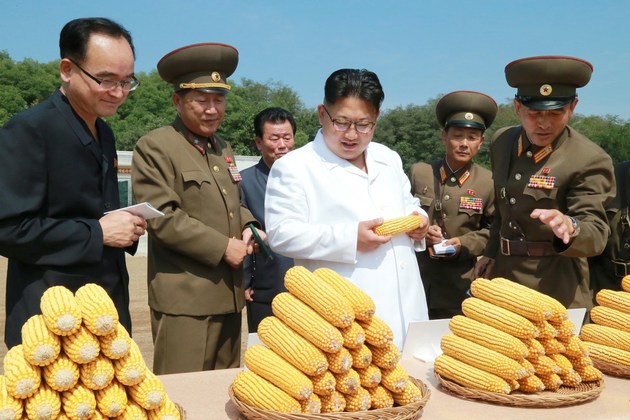North Korea’s Kim Jong Un appears to have adopted a scientifically unsupported theory that Covid-19 is likely to be transmitted by contact with imported dry goods, such as a cargo of grain or a shipment of fertilizer or farm machinery, Bradley K. Martin, the author of Under the Loving Care of the Fatherly Leader: North Korea and the Kim Dynasty writes for Asia Times.
North Korea’s healthcare system is primitive and could be overwhelmed in the event of a major surge of infections. Kim credits his 18-month total shutdown of the country’s borders for keeping the Covid rate at zero.
Scientists still disagree on the origin of the disease in humans, arguing over whether it crossed over in a bat cave or a biological lab or a “wet market,” where live animals were offered for sale followed by on-scene slaughter, butchering and packaging. Regardless of that disagreement, when it comes to how the disease spreads among humans the near-consensus view among scientists who have studied the question is that the coronavirus typically is spread by droplets in the air that have been expelled from the mouths of infected people.
Medical experts generally think that Covid-19 transmission via contaminated surfaces probably isn’t a major source of infection. The reason public health officials urge that you disinfect your hands after you’ve shopped in a store is that droplets from infected people who’ve preceded you may have fallen on goods or on store surfaces. Having touched those goods or surfaces with your hands, you’d be wise to avoid touching your hands to your mouth, eyes or nose.
Here, is the latest advice from the US Centers for Disease Control and Prevention (CDC). The risk of getting Covid-19 from food you cook yourself or from handling and consuming food from restaurants and takeout or drive-thru meals is thought to be very low. Currently, there is no evidence that food is associated with spreading the virus that causes Covid-19. The risk of infection by the virus from food products, food packaging or bags is thought to be very low. Currently, no cases of Covid-19 have been identified where infection was thought to have occurred by touching food, food packaging or shopping bags. Although some people who work in food production and processing facilities have gotten Covid-19, there is no evidence of the virus spreading to consumers through the food or packaging that workers in these facilities may have handled.
The regime, ever since January last year, has largely suspended the import of such essentials as grain and fertilizer. It was assumed that the restrictions were mainly aimed at keeping any transport workers and distribution people involved from crossing into North Korea, in case they might be infected. Recent news suggests otherwise. Lately, there have been a number of indications that it’s not just the people.
“North Korean authorities recently elevated the Ministry of Public Health’s National Institute of Hygiene Inspection to a ‘bureau’ with a vastly strengthened role,” reports DailyNK. The account continues: While ordering the establishment of the new bureau, North Korean leaders demanded that everything be done to prevent the coronavirus from “infiltrating” the country “through objects from the outside world” as “nobody can predict when the global Covid-19 pandemic will end, and [because] another pandemic could occur in the future.”
The country’s leadership pointed out that the new bureau should first and foremost stop government agencies and officials from “unconsciously committing random acts” as viruses could enter the country and cause irreversible disasters “because of objects [goods or products] from the outside world [the country] doesn’t need right away.”
For example, the authorities pointed out the “treasonous behavior” by some factories and enterprises of smuggling machinery across the China-North Korea border by designating the wares “necessary items.” Meanwhile, there’s this: “International mail has also come to a complete halt due to the refusal to accept mail from China,” reports Osaka-based AsiaPress.
The WHO says it’s highly unlikely that a package from an area with coronavirus will infect a person. Reports suggest the regime has not explained its actions anywhere near persuasively to the population. A side effect of the strong quarantine measures has been a severe economic deterioration, and the situation has already reached the humanitarian crisis level. I’m more afraid of hunger than of coronavirus’ – this is what the residents feared a year ago, and it has come true.
Daily NK quotes an unnamed source as suggesting that, facing a major food crisis, Kim is looking for excuses to blame subordinates and carry out a major purge. “Every time they’ve faced difficulties,” said the source, the authorities “have avoided a crisis by killing or dismissing cadres.”
Another foreign Pyongyang-watching colleague’s somewhat similar suggestion that what we see reflects a developing “bunker mentality.” We may be getting slightly closer – although we’re not there yet – with this comment from a humanitarian NGO worker who has dealt with the regime: “In perceived emergencies societies tend to circle the wagons against foreign influences: biological or ideological.”






